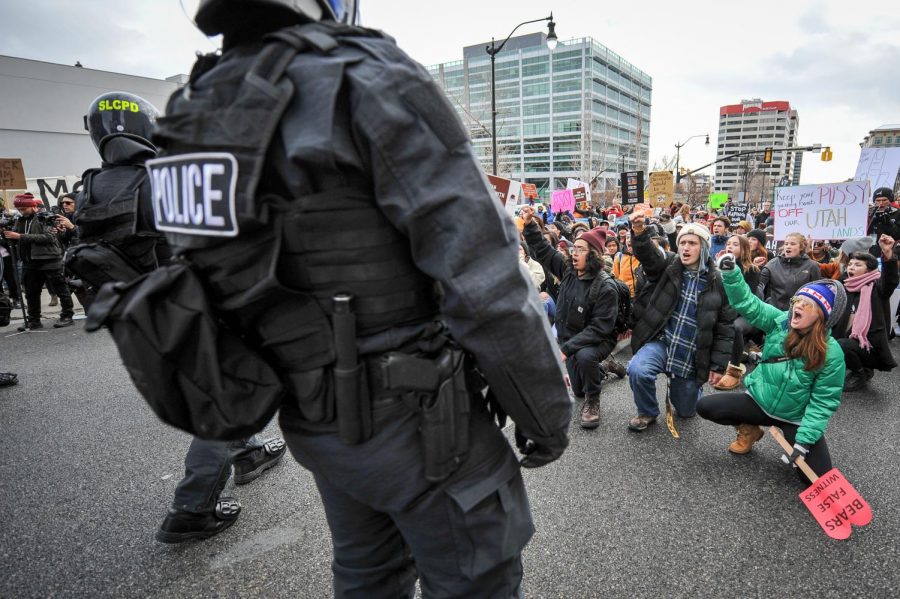Burton: Policing Civility is Excessive and Ineffective
At the protest downtown against President Donald Trump during his visit to the State Capitol in Salt Lake on Monday, Dec. 4, 2017. | Chronicle archives
March 11, 2020
Among the many bills deliberated during this particularly hectic legislative session was Sen. Don Ipson’s S.B.173.
The bill would criminalize disorderly conduct in official meetings and intentionally disrupting government meetings, including legislative meetings, committees, task forces and others. Disruptors would be warned verbally, but if they continue, the violator could then receive a class A to a class C misdemeanor charge. Sen. Ipson said that the bill aims to promote civility in public meetings, but despite any good intentions, S.B.173 is an egregious solution to a small problem and proves to be cruel, heavy-handed and ineffective.
A Harsh Solution to a Small Problem
S.B. 173 aims to solve a problem known in legal circles as the “heckler’s veto” — when a protestor takes away a speaker, government or organization’s ability to express an opinion through anticipated or actual protest. The constitutionality of a heckler’s veto is up for debate, but it certainly causes issues for speakers or public servants. In the case of government meetings, disruptions prove to be problematic as lawmakers are trying to make policy but are unable to meet because of disruptions, which would certainly be annoying. But should these interruptions be worthy of a criminal charge? Giving a criminal charge to a protestor who is earnestly opposed to a policy is arguably a violation of free speech. For those who simply want to provoke without political motives, a misdemeanor could cause them far more punishment than they deserve.
The bill would provide for a class C misdemeanor if the violation is a first offense, a class B misdemeanor for a second offense or a class A misdemeanor for the third or any subsequent offense. To put this into context, take for example a class C misdemeanor (the least punitive), which can mean up to 90 days in jail and up to $750 in fines. A considerable price to pay for even a few moments of outburst. Not only will they have a fine or possible jail time, but the person would also have a misdemeanor on their record, damaging background checks. Taking into account both the important rights to protest and consider legislation, if there has to be a penalty, an infraction would be much more reasonable. The consequence would still be a costly fine, but the looming consequence of jail time is not there.
More Reason to Protest
Sen. Ipson argues that the bill would promote civility and public safety, pertinent considering the violent Inland Port protests in the previous year — though Ipson did not explicitly cite this as a reason for sponsoring this bill. However, the policy outlined in this bill may only cause more indignation. In the eyes of many, this bill is an obvious and thinly-veiled attempt to curb dissent — if S.B. 173 were to become law, the chances of disruption and even more large scale protests are likely high. Dissent is absolutely necessary for holding governments accountable. Many of the most pivotal events of U.S. history have been thanks to dissent, from the creation of the nation to the civil rights movements. Ultimately, S.B. 173 creates even more reason to protest and with good reason.
Unfortunately, a version of the bill passed the Senate unanimously, showing a blatant disregard for careful legislative deliberation and free speech protections. If this bill is passed, it would not be surprising to see little to no change in the number of protests held at legislative meetings, nor would it be surprising to see protests against this policy. S.B.173 may have some rationale, but its proposed solutions are extreme and ultimately counterproductive.









James Lucas • Mar 12, 2020 at 7:28 am
Mr. Burton argument is the same one I’ve heard time and time again, that it’s my free speech right to censor any speech, ideal, or expression that I don’t agree with. Yes disrupting a speech, lecture, a meeting, etc. is censorship. I have attended speeches that were disrupted by protesters chanting, making loud noises, blocking podiums, doing any and everything they can to make it so the speaker could not be heard. I have seen displays trashed and signs torn down and ripped up all because someone didn’t like the message being sent. I have also seen people physically attacked for promoting their views or beliefs. According to Mr. Burton and others, their “free speech” right trumps the rights of a speaker to be heard or an audience right to hear what’s being said. That their attempts at censorship should be absolved because their hearts are in the right place. I’m sorry but no censorship is not a free speech right. I’m all for protesting, but once you cross that line and make so others can not express themselves, then there needs to be consequences and people need to be held accountable for their actions.